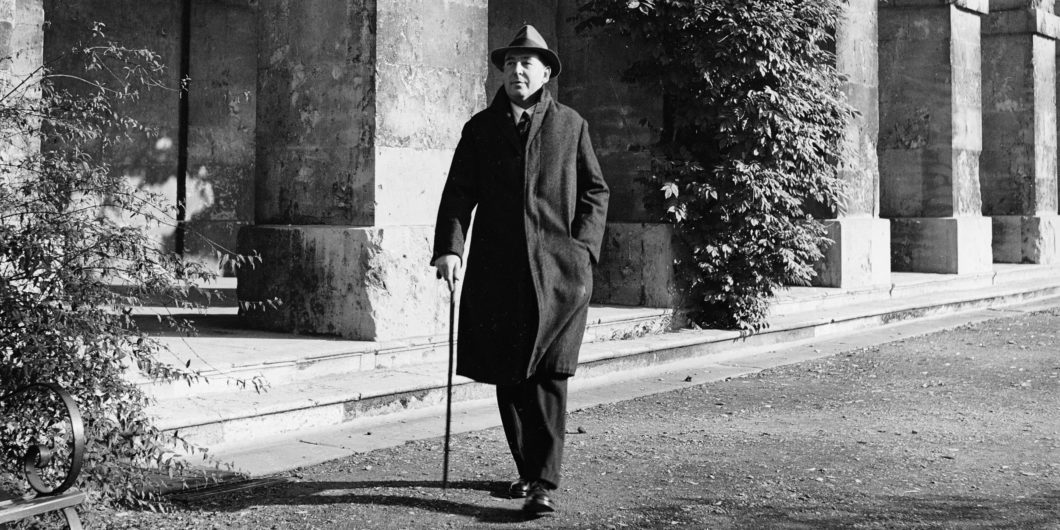Poetry in a Godless World
Deprived of the infinite, man has become what he always was: a supernumerary. He hardly counts; he forms part of the troupe called Humanity; if he misses a cue, he is hissed; and if he drops through the trapdoor another puppet is in readiness to take his place.
― Remy de Gourmont, Philosophic Nights in Paris, Being Selections from Promenades Philosophiques
“A name makes reading too easy,” Foucault remarked in his essay “The Masked Philosopher.” What the philosopher was saying in his typically gnomic way was that our reputations often speak louder than what we’re actually saying. Fame boxes us in, with the public projecting their collective fears and desires onto an individual who has been transformed into a sort of floating empty symbol. Opting to remain anonymous in a 1980 interview with Le Mond, Foucault went so far as to claim anonymity as a precondition for communication with a mass audience, the only shot at a “chance of being heard.” As Biehl and Zucker explain in “The Masked Anthropologist,” characters dominate our collective cultural consciousness “at the expense of truly hearing ideas and furthering critical thinking.” It’s so much easier to transcribe complexity into cliché rather than wrangle with the often confusing and paradoxical nature of another human mind.
With all that said, what would we read if we were to pick up a copy of C.S. Lewis’s first published work Spirits in Bondage, a collection of early poems recently republished by Lexham Press, without knowing the illustrious name of the volume’s author? Perhaps all we’re left with in this hypothetical is a publication date and location: 1919, London. With the poet masked, what do we see? Formally, the poetry is rather simple. Alternate and Couple rhyme schemes dominate. The poems are lyrical, conveying powerful but often confused emotion. Influences are obvious: Thomas Hardy, Matthew Arnold, the 1890’s Decadents. On its face, the work is quite mediocre. Its saving grace is what seems to be its own dissatisfaction with itself, which it confuses for a dissatisfaction with the world. Within this vexed malaise sits a profound sense of longing for “wider oceans, breaking on the shore / For which the hearts of men are always sore” as the poet writes in “Dungeon Grates.” This hunger for the infinite gives the collection more than the spark of life. It redeems the entire work.
The “masked poet” experiment answers the question of why we should even care about Lewis’s pre-Christian work (when he was an atheist at the time of writing). But it also proves that ultimately masking a poet is impossible. As the Spanish philosopher Ortega y Gasset wrote, “Yo soy yo y mi circunstancia,” (I am myself and my circumstances). This encapsulation of the great tragedy of human existence, the tug between freedom and necessity, between desire and the reality which “forms the other half of myself,” as Gasset wrote, is particularly applicable when it forms a segment of the drama of conversion. Every moment presents a set series of options. Every mistake is in actuality part of a grander narrative of which we are only dimly aware.
Before looking at the poetry, it’s worth pointing out that this edition of Spirits in Bondage is beautiful as a material object. Packaged in a slender, blueish-gray hardcover, the book is portable and durable. The cover art, a human skull set in front of leaves and vegetation, is an appropriate image for a book so influenced by the Gothic and the decadent. The design is apposite. There’s something almost arcane about it, which is itself suitable for a book that was a bit dated even when it was published. This anachronistic quality is common in immature work simply for the fact that the developing artist performs his influences without having properly digested them. As Karen Swallow Prior explains in her fantastic introduction: “This heavy influence by earlier poets appears not only in the ideas of the poems, but in their form as well. In fact, the intricate style of many of the poems was already outdated when they were published—partially explaining the cool critical reception that helped turn Lewis from writing poetry to prose, which would become his legacy.” A fitting felix culpa for a man on the path towards God. Nevertheless, many of the derivative poems are quite moving. Take the final two verses from the short poem “Spooks,” about a lover who wanders home only to realize that he has died long ago:
Till suddenly it came into my head
That I was killed long since and lying dead—
Only a homeless wraith that way had passed.
So thus I found my true love’s house again
And stood unseen amid the winter night
And the lamp burned within, a rosy light,
And the wet street was shining in the rain.
Most of the language is muffled by convention, and the subject itself isn’t anything new, but the accumulative effect of the poem is brought to crescendo by that striking last line. The wet street shining in the rain is such a fantastic image that it almost acts as a promissory note towards future accomplishments.
Another mark of the amateur is that their work is too much about the poet’s own time. They can’t yet see their way out of the present moment. One comes across instances in Spirits, but they exist alongside bright flashes of insight that cut through the fog of faddishness. World War One plays a walk-on role in the collection of poems, and Lewis impressively keeps his poetic imagination tuned beyond the usual cliches. The poem “French Nocturne (Monchy-Le-Preux)” is one of the most impressive in the collection. In language that is spare, almost spectral, Lewis paints a surreal portrait of a warzone in which the “jaws” of a “sacked village” have “swallowed up the sun.” A plane flies “straight into the moon,” which in the “vulgar eye” of the narrating soldier has lost its allure and reduced to “a stone that catches the sun’s beams.” The nightmare culminates in the final stanza:
What call have I to dream of anything?
I am a wolf. Back to the world again,
And speech of fellow-brutes that once were men
Our throats can bark for slaughter: cannot sing.
It’s harrowing, but also unique. Rather than writing a patriotic poem proudly extolling the virtues of the war dead, or like Pound lamenting a lost civilization, Lewis turns the war scene into an occasion to ruminate on man’s fallen nature. In some ways, it anticipates British poet/painter David Jones’s greatest work, In Parenthesis. Lewis’s “French Nocturne” might lack the style and impressive formal qualities of In Parenthesis but transforming g the war into what amounts to an ever-present state of human struggle, the young poet displayed an impressive vision and a profound sensitivity to the human soul in which he didn’t quite yet believe.
What makes these poems powerful is knowing that their desolation and anger are a kind of nascent love awaiting transformation.
Another influence of the time was the Decadent 1890’s, which gives Spirits in Bondage an early-Yeatsian “pixies in the moonlight” quality. Hence my opening quote from Symbolist poet and critic Remy de Gourmand. Symbolism, of course, was a specific movement which according to ’90s British Decadent poet Arthur Symons falls under the larger umbrella term “Decadent”. Both raged against the often harsh reality of nature, but Symbolism used fragmentary and nearly hallucinogenic images of the world to elevate the mind of the reader into a transcendent state. In Mallarmé’s poem “Flowers”, for instance, the image of the flower is meant to direct the reader towards an ersatz spiritual experience in which the passing of time itself is felt as an “eternal snow of stars” across an ever-changing cosmos. Decadence on the other hand takes a more cynical and antagonistic view of nature and ultimately of language itself. Nature is cruel and mysterious and our words are not a path to some higher truth, but simply novel creations of the human mind. The poems in Spirits partake in this Decadent conception of language and reality. It’s a world of monsters and spirits, certainly, but shorn of any suggestion of transcendence and without the presence of divine Logos as an organizing principle. Lewis wrote to a friend in 1918, a year before the collection was published, that “nature is wholly diabolical and malevolent and that God, if He exists, is outside of and in opposition to the cosmic arrangement.” As such, the tone of many of the poems vacillates between a sorrowful paganism and a kind of irate Neo-Platonism, angered by the demiurge who created the sorrowful world without completely believing in him. Take the first stanza of “De Profundis” for example:
Come let us curse our Master ere we die,
For all our hopes in endless ruin lie.
The good is dead. Let us curse God most high.
The naïve anger at an absent or nonexistent God is fascinating in light of Lewis’s later work. The creepy supernatural imagery is interesting as well. A few lines from “The Witch,” for example:
The lonely woodman half afraid
Far off her ragged form as seen
Sauntering down the alleys green,
Or crouched in godless prayer alone
At eve before a Druid stone.
But now the bitter chase is won,
The quarry’s caught, her magic’s done,
The bishop’s brought her strongest spell
To naught with candle, book, and bell;
With holy water splashed upon her,
She goes to burning and dishonour
Too deeply damned to feel her shame,
For, though beneath her hair of flame
Her thoughtful head be lowly bowed
It droops for meditation proud
The witch, while in some sense evil, is also made into a hero or martyr, although what she dies on behalf of is unclear. Perhaps Lewis has her immolated as a martyr to his own desire for transcendence and the re-sacralization of the world. As Lewis himself would later explain in Surprised by Joy, “I was at this time [around the publication of Spirits] living, like so many Atheists or Antitheists, in a whirl of contradictions. I maintained that God did not exist. I was also very angry with God for not existing. I was equally angry with Him for creating a world.”
Does having a context for this anger make the poems richer and more complex? It would seem so. If the poet were masked, if all we had were the words on the page of this specific book, we might put it down thinking that it’s the immature production of a one-hit Decadent wonder. A few arresting lines here and there, a few poems that linger in your mind after reading, but nothing to compare to more celebrated work of the period. Only by keeping in mind Gasset’s conception of self– not an isolated and untouched individual node in the world but an aggregate of roles and various other influences– can we understand the change that attends Lewis’s Christian conversion.
What makes these poems powerful is knowing that their desolation and anger are a kind of nascent love awaiting transformation. Palpable throughout Spirits in Bondage is Lewis’s not-so-well-hidden desire for the eternal. The book is important for a number of other reasons—it’s the first published work of one of the most preeminent Christian writers of the twentieth century being foremost among them—but what makes the show worth the price of admission is to watch Lewis’s language try and fail to keep up with the depth of his spiritual desires. These poems long for the transcendent and the immanent at once, and they exhaust themselves in the limitless pull towards God.



